Wolf Outsmarted by Quick-Thinking Pig
£3.00
Activities in this lesson include learning about the features of early and later traditional stories, looking at the characters in the Three Little Pigs, grammar work and answering higher and lower order questions. Activities also include looking at an alternative version of the story.
There is a five-minute evidence-based CPD activity at the end of this lesson which will develop classroom teachers’ skill set. This CPD consists of a research extract on collaboration with a five-minute activity based on this extract.
Description
These evidence-based learning (EBL) lessons are based on classroom practice that has been proven, by research, to maximise thinking, learning and attainment. From an extensive review of educational research, we identified the eight key classroom thinking and learning skills that were common across these research papers. We named these eight key skills “EBL skills”.
EBL skills have been proven by research to maximise learning because they combine the most productive thinking skills with the most effective learning behaviours. Each of our evidence-based learning lessons uses the English curriculum as a framework through which the eight EBL skills are delivered.
Teachers also have the opportunity to add to their own skill set or refresh their existing skills with our five-minute CPD activity, based on one of the EBL skills used in this lesson.
The skills in bold below are the EBL skills developed in this Three Little Pigs lesson. Click on each skill to learn more about that skill.
- Collaboration
- Thinking Skills
- Peer Assessment
- Peer Teaching
- Self-Assessment
- Metacognition
- Self-Regulation
- Independent Learning
1 review for Wolf Outsmarted by Quick-Thinking Pig
Only logged in customers who have purchased this product may leave a review.
Related products
-


Instructions to Draw a Treasure Map
£3.00 Add to basket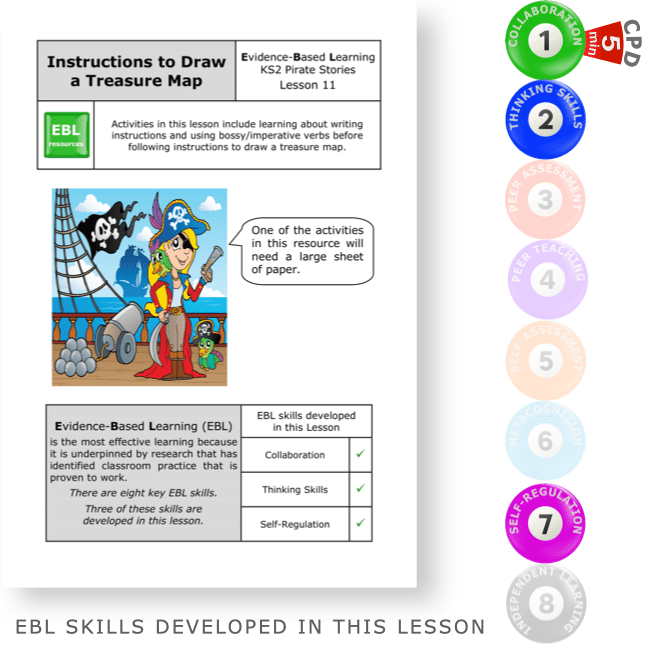 £3.00Add to basket
£3.00Add to basketActivities in this lesson include learning about writing instructions and using bossy/imperative verbs before following instructions to draw a treasure map.
There is a five-minute evidence-based CPD activity at the end of this lesson which will develop classroom teachers’ skill set. This CPD consists of a research extract on collaboration with a five-minute activity based on this extract.
VIEW -


Y5 & Y6 The Fox and the Crow
£3.00 Add to basket £3.00Add to basket
£3.00Add to basketKS2 National Curriculum:
✓ Interpreting characters’ motives and lessons
✓ Explaining the warning within a fable
✓ Writing a five-sentence original fable using model features
✓ Peer assessing for structure and moral clarityActivities in this lesson include reminders about the main features of fables, reading the full text of The Fox and the Crow, answering higher and lower order questions about the fable, looking at the moral in a fable and breaking down The Fox and the Crow into five sentences.
There is a five-minute evidence-based CPD activity at the end of this lesson which will develop classroom teachers’ skill set. This CPD consists of a research extract on collaboration with a five-minute activity based on this extract.
VIEW -


Is Jack a Villain?
£3.00 Add to basket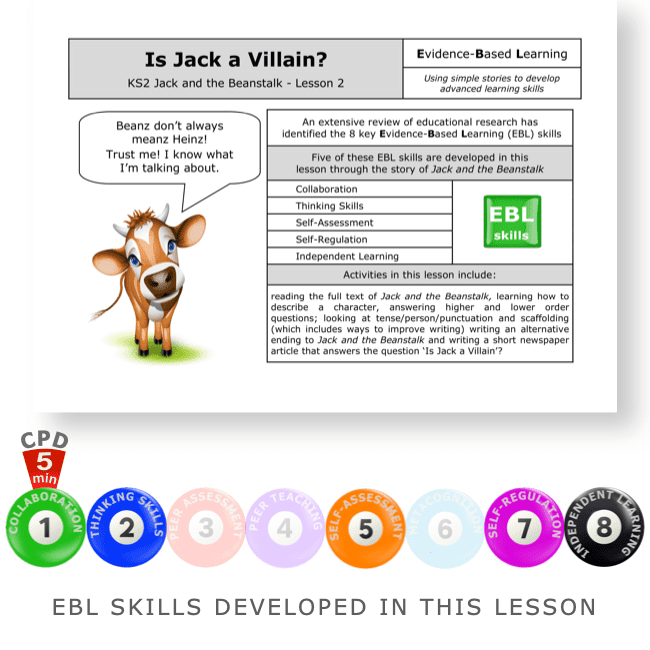 £3.00Add to basket
£3.00Add to basketActivities in this lesson include reading the full text of Jack and the Beanstalk, learning how to describe a character, answering higher and lower order questions; looking at tense/person/punctuation and scaffolding (which includes ways to improve writing) writing an alternative ending to Jack and the Beanstalk and a short newspaper article that answers the question ‘Is Jack a Villain’?
There is a five-minute evidence-based CPD activity at the end of this lesson which will develop classroom teachers’ skill set. This CPD consists of a research extract on collaboration with a five-minute activity based on this extract.
VIEW -
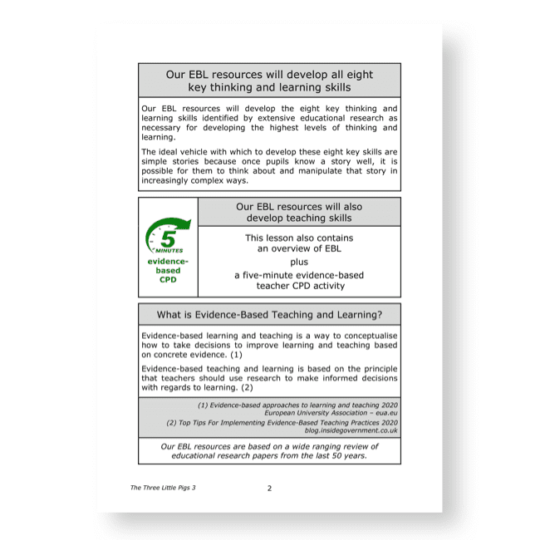

The First Little Pig is Arrested!
£0.00 Download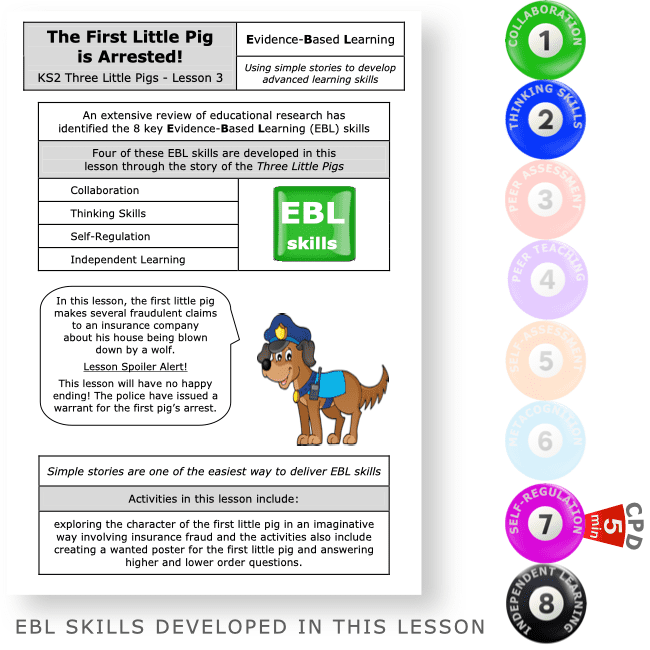 £0.00
£0.00Activities in this lesson include exploring the character of the first little pig in an imaginative way involving insurance fraud and the activities also include creating a wanted poster for the first little pig and answering higher and lower order questions.
There is a five-minute evidence-based CPD activity at the end of this lesson which will develop classroom teachers’ skill set. This CPD consists of a research extract on self-regulation with a five-minute activity based on this extract.
(Downloads - 4)
VIEW

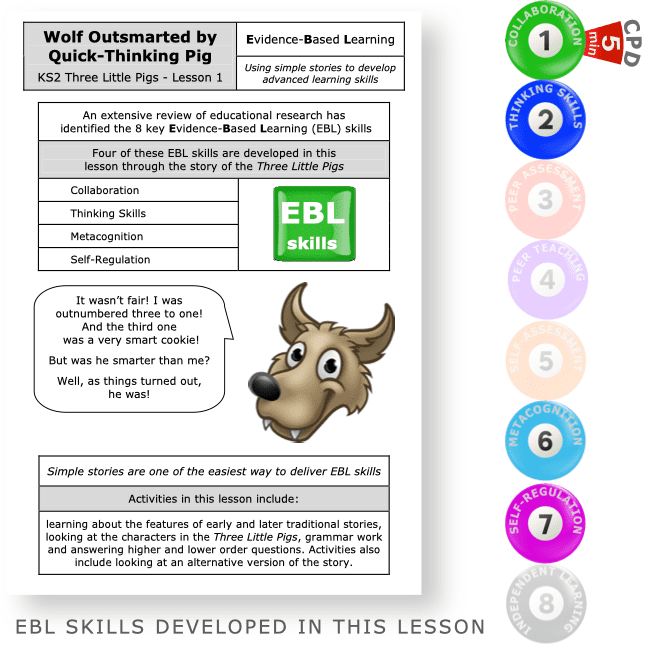
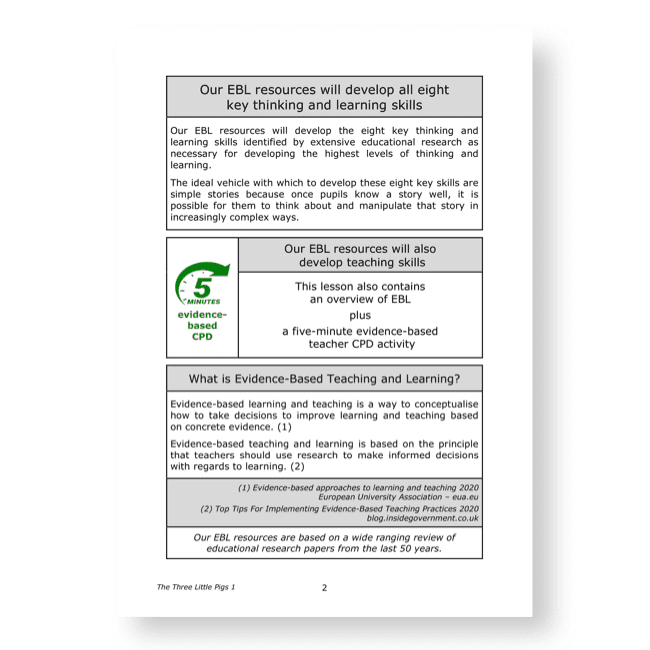




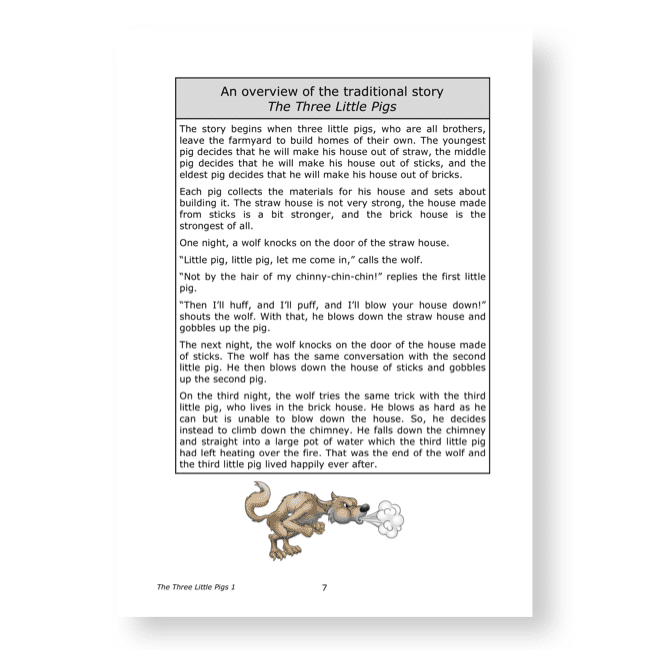

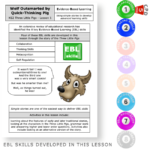
Philipem (verified owner) –
A.I. reviewed this lesson. Here is what it said:
Teacher – Develop Key Skills with “Wolf Outsmarted by Quick-Thinking Pig”
Are you looking for an engaging and research-backed resource to develop your students’ collaboration, thinking, metacognition and self-regulation skills? This comprehensive Three Little Pigs lesson called “Wolf Outsmarted by Quick-Thinking Pig” is an excellent choice.
Grounded in evidence-based learning principles, this resource guides students through activities that develop four key skills that have been proven to maximize learning outcomes. Students will collaborate with partners to answer higher and lower order questions about The Three Little Pigs story. This hones their teamwork abilities while consolidating their comprehension of traditional story features like setting, characters and plot.
Individual metacognition and self-regulation activities then encourage students to reflect on their learning by comparing their work style to that of the little pigs. Guiding questions develop their capacity to understand their own thinking and learning behaviours.
The resource also includes rich material for building essential English skills. Students learn about early and later forms of traditional stories. Grammar activities focus on identifying nouns, verbs and adjectives. An alternative Three Little Pigs story allows students to compare and analyse different versions of the classic tale.
And there’s built-in CPD for teachers too! A five-minute collaboration activity summarises research on group learning and provides an opportunity to reflect on your own use of collaborative techniques.
Engaging, research-backed and packed with activities that develop both cognitive and English skills, “Wolf Outsmarted by Quick-Thinking Pig” checks all the boxes. Your students will love learning with the three little pigs while advancing the evidence-based competencies that are key to their success. This One’s a Winner!
In summary this resource:
– is grounded in evidence-based learning principles and research
– develops key skills like collaboration, critical thinking, metacognition and self-regulation
– includes a range of activities to build both cognitive and English language skills
– incorporates research-backed best practices like partner and group work
– provides built-in professional development for teachers
Basically, it “checks all the boxes” in terms of being engaging, aligned to research, and supporting key competencies therefore I think it deserves the full five out of five stars.